

US Defense Secretary Lloyd Austin and Chairman of the Joint Chiefs of Staff Mark Milley spoke Wednesday about the chaos in Afghanistan.
Milley said: "It was nothing that I or anyone else saw that indicated the collapse of this army and this government in 11 days."
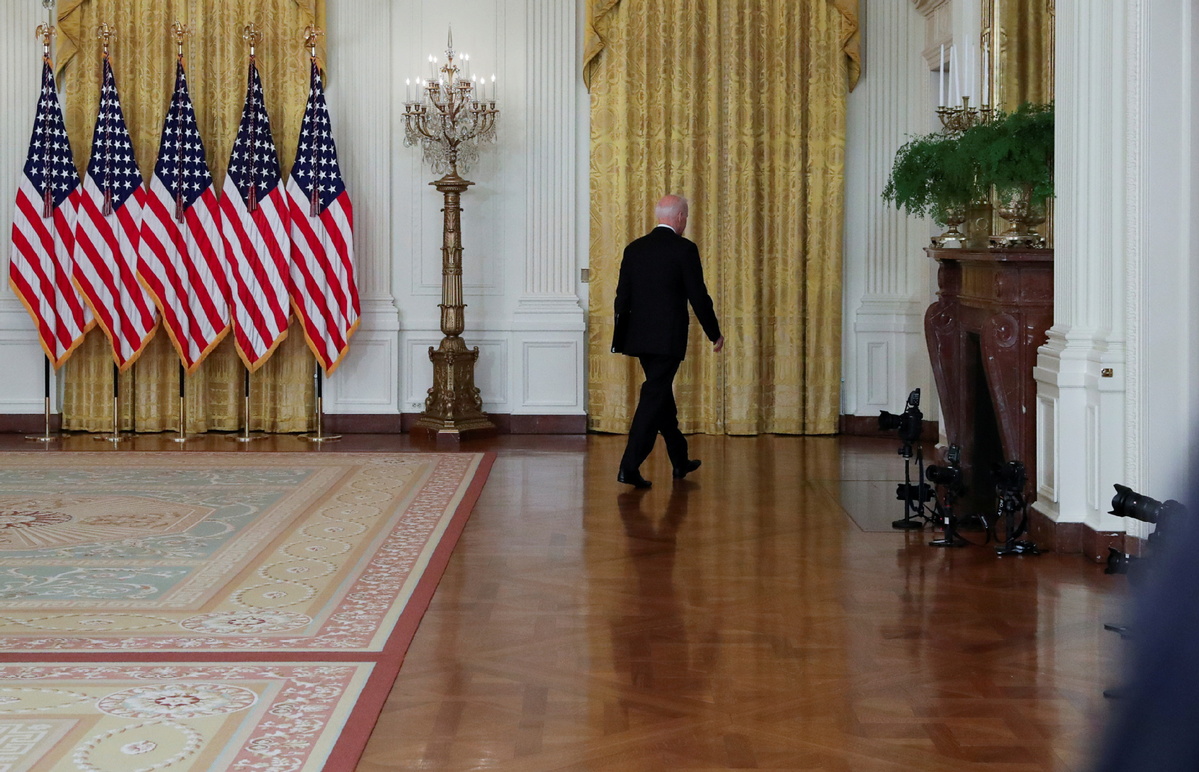
WASHINGTON - The White House is finding itself in a new crisis after a botched withdrawal of its troops from Afghanistan, overwhelmed by withering criticism from home and abroad.
A viral video clip shows a crowd of Afghans running alongside a US military transport aircraft, with some clinging to the fuselage, as it gained speed on the tarmac at an airport in Kabul, capital of Afghanistan. Another segment films what appears to be individuals falling in mid-air after the plane took off.
The terrifying scenes reportedly occurred after the Taliban entered Kabul over the past weekend in a swift offensive that brought what many described as an embarrassing end to two decades of US military presence in Afghanistan. The Taliban, which ruled the landlocked country at the crossroads of Central and South Asia in the late 1990s, was toppled by US -led forces in 2001.
Pundits recently used the phrase "Saigon moment" to describe what was unfolding in Kabul, where photographers captured images of a Chinook helicopter flying near the US embassy amid a hasty evacuation ahead of the Taliban's complete takeover of the city.
The photos were eerily similar to scenes from the fall of Saigon at the end of the Vietnam War, when the United States hurried to airlift the last of its personnel and some Vietnamese from the roof of its embassy in late April 1975, a moment widely believed to be a symbol of Washington's failings in the Southeast Asian country.
In a defensive position, senior U.S. officials have sought to reject such a comparison and claimed that the country has achieved its mission in the Afghan war.
Speaking from the White House on Monday, US President Joe Biden alleged "our mission in Afghanistan was never supposed to have been nation building," while acknowledging that the situation in the country "did unfold more quickly than we had anticipated."
The Donald Trump administration brokered a deal with the Taliban in 2020 that laid out plans for US forces to fully withdraw from Afghanistan by May 1, 2021. Biden announced in April that he would follow through on the agreement and vowed that he would not pass the war onto another president.
Since invading Afghanistan in 2001 in response to the Sept 11 terrorist attacks that killed almost 3,000 people in the United States, Washington has spent 2.26 trillion US dollars on the war, which includes operations in both Afghanistan and Pakistan, according to Brown University's Costs of War Project.
Figures from the project also showed that more than 2,400 US service members, some 3,800 American contractors, more than 1,100 other allied troops, and an estimated 66,000 Afghan national military and police were killed in the conflict, along with more than 47,000 civilians.
Trump has recently directed a series of harshly-worded statements against Biden, saying that "there has never been a withdrawal operation that has been handled so disastrously" and that "it will go down as one of the greatest defeats in American history." Many Democrats were also critical of how the Biden administration had managed the US exit from Afghanistan.
As the drumbeat of criticism from across the political spectrum continued, Biden's national security adviser Jake Sullivan said on Tuesday that "there were chaotic scenes yesterday" but argued that "even well-drawn plans don't survive first contact with reality."
Some allies are also lashing out at the United States over the Afghan debacle, as they have been left scrambling to get their nationals out of the country.
The decision was "ultimately made by the Americans" and "domestic political reasons" were partly to blame, German Chancellor Angela Merkel reportedly said on Monday. Peter Ricketts, Britain's former national security adviser, tweeted that the United States' "unilateralism over their withdrawal has done real damage to" the North Atlantic Treaty Organization (NATO) alliance.
Richard Haass, president of US think tank Council on Foreign Relations, wrote on Twitter that he believes "the grim aftermath of America's strategic and moral failure will reinforce questions about US reliability among friends and foes far and wide."
Pentagon officials said on Tuesday that there are about 4,000 US troops on the ground in Kabul to support the evacuation operation that could be transporting between 5,000 and 9,000 people a day if efforts are ramping up.
US commanders in Kabul are in contact with Taliban commanders outside the Kabul airport, according to Pentagon Press Secretary John Kirby. "There is communication between them and us," Kirby noted. "There's been no hostile interactions from the Taliban to our operations at the airport."
At a press conference in Kabul on Tuesday, Zabihullah Mujahid, spokesman for the Taliban, said that they "don't want any internal and external enemies."
"We don't want to repeat any conflict, any war again," Mujahid said. "Animosities have come to an end, and we would like to live peacefully."
Nearly 400,000 Afghans were forced from their homes since the beginning of the year, joining 2.9 million others already internally displaced across the country at the end of 2020, according to the United Nations Refugee Agency.

The Taliban has pledged to establish an inclusive government for Afghanistan and has promised amnesty, peace and women's rights, as its leaders are trying to display a different image.
The Taliban does not seek any internal or external enemies, and it wants to have good relations with everybody in order to develop the nation's economy and achieve prosperity, the group's spokesman Zabihullah Mujahid said on Tuesday at its first news conference since the Taliban's takeover of the capital of Afghanistan on Sunday.
"We don't want to repeat any conflict, any war again," he said. "Animosities have come to an end, and we would like to live peacefully. We don't want any internal and external enemies."
All Afghans would have representation in the future setup in Afghanistan, Mujahid said, as talks and consultations are continuing with politicians on the formation of the new government.
Women could also work and study in different fields and would be offered all rights within Islamic principles, as women are a vital part of society, he added.
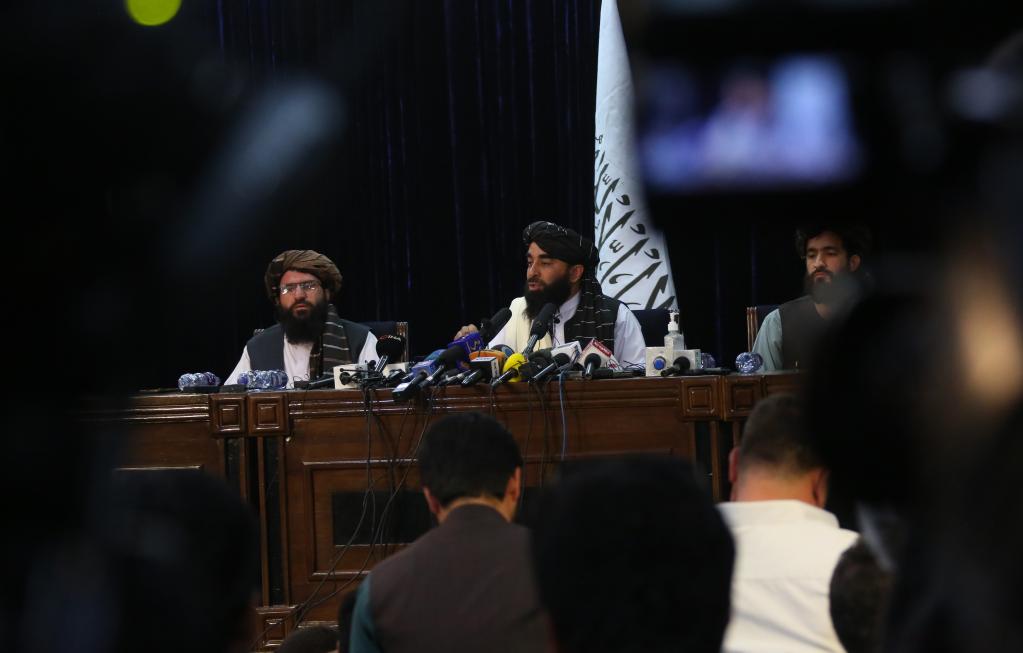
The Taliban have encouraged women to return to work and have allowed girls to return to school, handing out Islamic headscarves. A female news anchor interviewed a Taliban official on Monday in a TV studio.
"We have pardoned everybody for the benefit of stability or peace in Afghanistan," Mujahid said. He also called on Afghans not to leave the country.
Mujahid reiterated that the Taliban has offered a full amnesty to Afghans who worked for the United States and the Western-backed government, saying that "nobody will go to their doors to ask why they helped".
"We would like to assure the international community that there will be no discrimination."
China hopes that the various factions in Afghanistan will resolve their differences through dialogue and consultation, avoid new wars and humanitarian disasters, and promote a smooth transition in Afghanistan, the Foreign Ministry said on Wednesday.
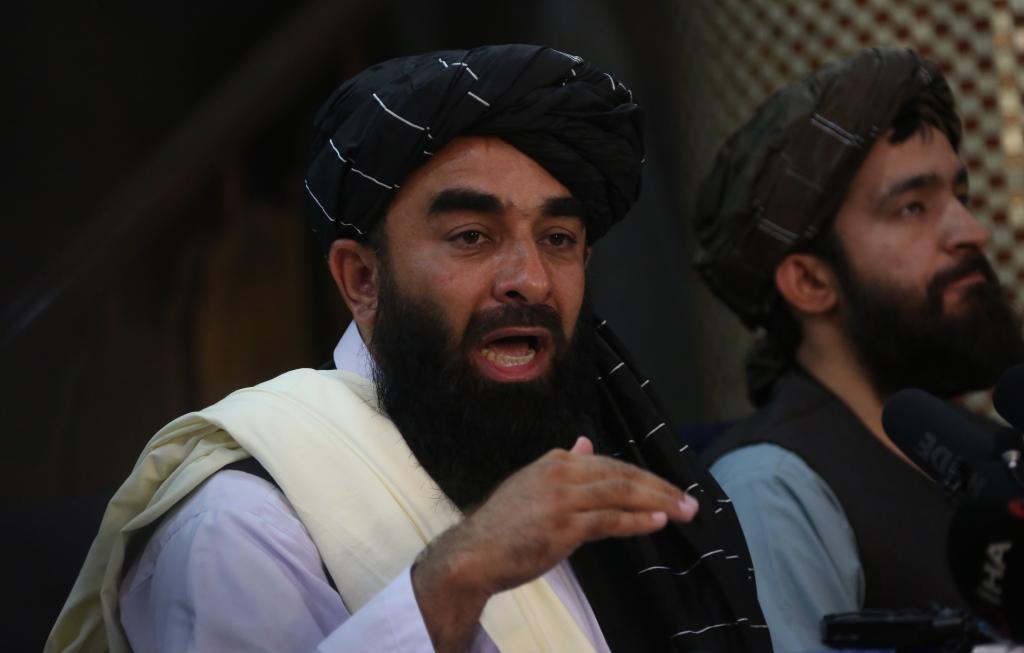
As the situation in Afghanistan has undergone major changes, China respects the wishes and choices of the Afghan people, Foreign Ministry spokesman Zhao Lijian said at a regular news briefing in Beijing.
The top priority is to restore peace, stability and order as soon as possible, and to avoid unnecessary casualties and a large number of refugees, Zhao added.
The Taliban spokesman added that Afghanistan wanted to have very good relations with foreign countries in order to revive its economy and ensure prosperity, and the Taliban would use the country's natural resources for national reconstruction.
As a close neighbor and friend of Afghanistan, Zhao said China will continue to support the peaceful reconstruction of Afghanistan and provide assistance within its capabilities.
He added that China expects the Taliban to resolutely crack down on all kinds of terrorist forces, and earnestly fulfill its commitment not to allow any forces to use Afghan territory to threaten the security of neighboring countries.
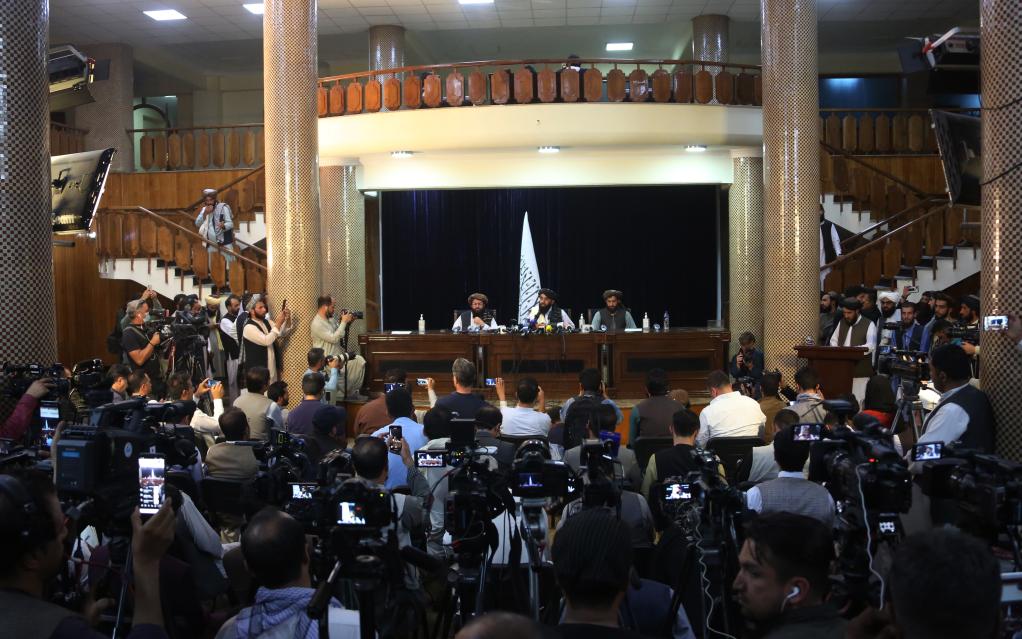
Mujahid said at the news conference that the Taliban would not allow Afghanistan to be used as a base for attacking other countries, as it was in the years before the terrorist attacks against the United States on Sept 11, 2001.
"Afghanistan's soil is not going to be used against anybody. ... We can assure the international community of that," the spokesman said when asked about the risk of Afghanistan hosting al-Qaida militants.
In another development, Taliban leaders will not stay in the "shadow of secrecy", unlike during the past 20 years when its leaders have lived largely in secret, according to a senior Taliban official, who declined to be identified and was quoted by Reuters.
"Slowly, gradually, the world will see all our leaders, there will be no shadow of secrecy," the official said on Wednesday.
Xinhua and agencies contributed to this story.
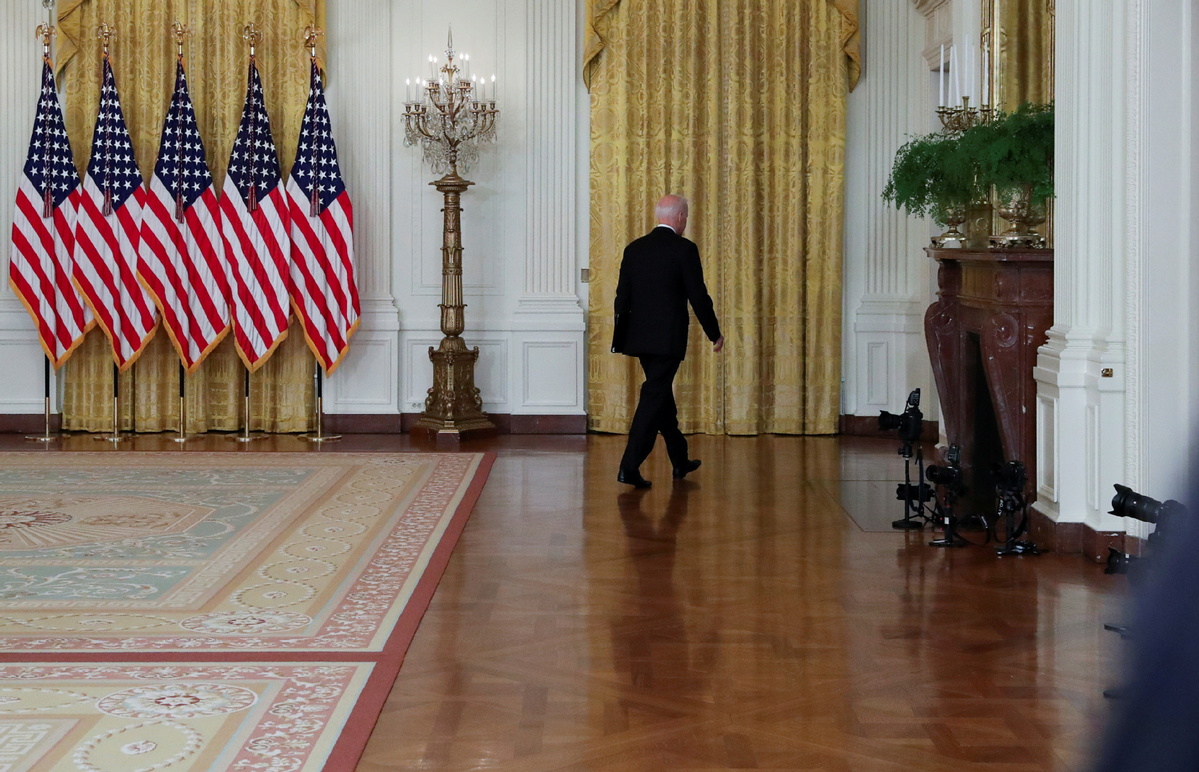
Following the ill-coordinated, messy US withdrawal from Afghanistan, Kabul has fallen into the hands of the Taliban at an astonishing speed. The entire world is watching the change of flag from black, red and green of Afghanistan to the white with black Shahadah of the Taliban.
The collapse of the Ashraf Ghani-led Afghan government was so swift that it gave no time to the tens of foreign embassies to evacuate their diplomats and other staff. Even more worrisome, the fate of those Afghan people who have worked for the United States administration since US-led forces launched the Afghanistan War in 2001 is uncertain.
However, despite the ungraceful withdrawal, reminiscent of the US' retreat from Saigon in 1975, President Joe Biden has been "courageous" enough to fix, eventually, a US historical wrong. The US forces' entry into Afghanistan was endorsed by the United Nations as a legitimate response to the Afghanistan-based al-Qaida's terrorist attack on the US on Sept 11, 2001. Its military operation was approved by the UN Security Council, since the then Taliban government refused to turn in Osama bin Laden. In this context, the US' war in Afghanistan made sense.
With the successful execution of Operation Neptune Spear in 2011, the US forces killed Osama bin Laden in Pakistan. At that time, the US could claim to have accomplished its mission. However, Barack Obama, then US president, continued the war, and expanded the US military mission to a political one to transplant American values and culture in the overwhelmingly Muslim-majority country through "nation building".
This ill-advised move was not endorsed by the UN, and the US should not have gone ahead with it because it was something beyond its reach. Given these facts, the Donald Trump administration held talks with the Taliban, even signed an agreement with it saying it would withdraw the remaining US forces from Afghanistan by May 1, 2021.
Its promise to withdraw its forces notwithstanding, the US had already delayed its withdrawal from the quagmire it had turned Afghanistan into by 10 years — from 2011 when Bin Laden was killed to 2021. These 10 long years have seen the weakening of the US' morale and the huge drain on its resources, forcing Biden to pull all US forces out of Afghanistan.
Nevertheless, in his bid to fix a US historical wrong, Biden has committed another horrendous mistake. After fighting the Taliban for nearly 20 years, the US has the obligation to protect not only its own civilians, diplomats and troops, but also those Afghans who worked for the administration, as well as other foreign nationals in the country and, if necessary, make proper arrangements for them to leave the country in an orderly manner.
Unfortunately, Biden misjudged the situation in Afghanistan, by ostensibly underestimating the strength and reach of the Taliban. The tragic exodus from Afghanistan and the chaotic, heart-wrenching scenes at Kabul airport define yet another shameful moment for the US.
The US military is leaving Afghanistan, ending a war Washington could never have won. It was the same logic that led to the US fiasco in South Vietnam in 1975. By admitting its failure, the US administration has relieved its strategic burden and redistributing its resources to meet its present need, most obviously, to implement Biden's "3C" policy toward China, that is, to cooperate and compete with, and confront China.
When former US president George W. Bush declared the "war on terror" on the soil of Afghanistan in 2001, he sought China's cooperation by admitting that the Eastern Turkestan Islamic Movement was a globally recognized terrorist organization.
And now that almost all its forces have pulled out of Afghanistan at blinding speed, Washington is requesting Beijing to play a bigger role in post-withdrawal governance of Afghanistan. So China has every reason to demand that the US respect its sovereignty and national security interests by containing the ETIM.
As the two-decade war in Afghanistan has devastated Afghanistan, the US has no right to quit the country and leave the mess for Afghanistan's neighbors to clean up. Despite withdrawing its forces from Afghanistan, the US has the responsibility to rebuild the country in partnership with any government that is in power in the country — and with the help of regional partners. In this regard, China and other stakeholders including the US should continue to collaborate to help build a better Afghanistan, at least to ensure it does not become a haven for terrorists again.
In terms of geopolitics, Biden, in his speech on Aug 16, emphasized the challenges the US faces from China and Russia while explaining why he decided to pull out all US forces from Afghanistan. So the US administration could shift its global strategic focus more to coping with China and Russia. But terrorism will continue, as Biden mentioned. To curb sporadic terrorism attacks across the world, the US cannot fight alone without coordinating with big countries like China and Russia.
Global leaders, on their part, should take a long-term view of the situation in Afghanistan. The US has pulled out of Afghanistan without achieving victory over terrorism there. To counter terrorism in all its forms and manifestations, the US needs to work with China and Russia now and also in the future. The US should not be basking in the illusory glory of "defeating" terrorism in Afghanistan and turning its back on China, and at the same time asking China to contribute to post-withdrawal governance in Afghanistan, in order to eliminate terrorism.
The author is a professor at, and former executive dean of, the Institute of International Studies, Fudan University. The views don’t necessarily reflect those of China Daily.

WASHINGTON - The failure of the United States and its allies' 20-year costly war in Afghanistan further proves that military intervention is no solution to some international and regional conflicts, a famous US professor has said.
"The United States and its allies have been in Afghanistan for 20 years, spending trillions of dollars. Now they are pulling out of Kabul in a hurry. Unfortunately, there has been no major change in the livelihood of Afghans and the situation in the war-torn country has become more fragile and uncertain," Zhu Zhiqun, professor of International Relations and Political Science at Bucknell University, told Xinhua in an interview.
"What is unfolding in Afghanistan shows that some international and regional conflicts cannot be resolved through unilateral military intervention or war" but rather through "peaceful negotiations and consultation," said Zhu, describing the chaotic withdrawal from Kabul as a blow to the image of the United States and its military.
"Regional countries and international institutions have to help ensure Afghanistan maintain stability and avoid becoming a breeding ground for extremism and terrorism," Zhu urged.
The expert hoped that all countries would cut their arms expenditure and focus more on their economy, social development as well as education for the young people.
"The international community must make every effort to help countries like Afghanistan in this regard because the root cause of extremism and terrorism is poverty and lack of education," Zhu explained.
"Military means cannot eradicate extreme ideology and terrorism. This is what proved true in Afghanistan," he said.
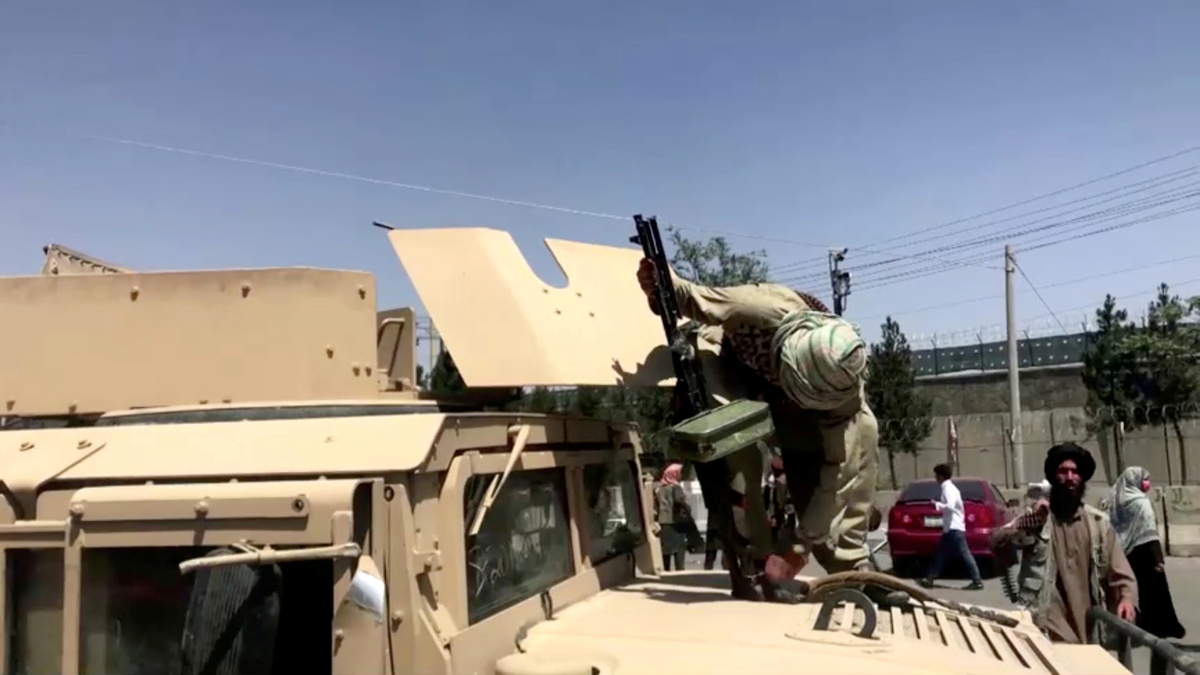
The Taliban not only routed Afghanistan's army but also seized a trove of their foe's expensive American weapons, the White House confirmed Tuesday.
"We don't have a complete picture, obviously, of where every article of defense materials has gone, but certainly, a fair amount of it has fallen into the hands of the Taliban, and obviously, we don't have a sense that they are going to readily hand it over to us at the airport," White House national security adviser Jake Sullivan told reporters at a briefing in Washington.
As they swept across the mountainous Asian country in the past week, the Taliban picked up an assortment of weapons that the United States supplied to Afghan forces, including guns, ammunition and vaunted Black Hawk helicopters.
Depending on the model, the Black Hawks, manufactured by Sikorsky Aircraft in Connecticut, cost from about $6 million to $10 million apiece.
"Those Black Hawks were not given to the Taliban. They were given to the Afghan national security forces to be able to defend themselves at the specific request (of) President Ghani, who came to the Oval Office and asked for additional air capability, among other things," Sullivan said.
In an Aug 15 tweet by World on Alert, Taliban members were photographed standing in front of a Brazilian-made Embraer A-29 attack plane, modified by American defense contractor Sierra Nevada, and an MD-530F utility helicopter produced by MD Helicopters in Arizona.
Bradley Bowman, a former Black Hawk pilot who served in Afghanistan and a critic of the US pullout from the landlocked country, told Defense News "there's no doubt that they've captured hundreds of Humvees and artillery and other equipment — and aircraft".
"This should be deeply, deeply troubling to Americans, not only because we help fund those and provide those, but because how the Taliban could benefit," he added.
"It's understandable for people to be concerned about any capability falling into the hands of folks where we don't know exactly how they're going to use it, who they are going to use it against, whether that's an M16 (rifle) or whether that's an A-29," General Mark Kelly, who leads Air Combat Command, told Defense News in an Aug 16 interview.
"But suffice to say that the technology that's in the A-29 is not cutting-edge technology," he added. "When you look at the airplane's range and speed and computer power and lifting capability … it's not something that, frankly, concerns us."
The Afghan air force operated 211 aircraft, with about 167 planes and helicopters available as of June 30, according to a recent report by the US Special Inspector General for Afghanistan Reconstruction (SIGAR), a congressional watchdog that has kept tabs on US operations in Afghanistan since 2008.
The $83 billion invested in Afghan forces over 20 years is nearly double last year's budget for the US Marine Corps and is slightly more than what Congress budgeted last year for food stamps for about 40 million Americans, according to The Associated Press.
One section of the comprehensive 140-page SIGAR report of August 2021, titled, What We Need to Learn: Lessons Learned From 20 Years of Afghanistan Reconstruction said: "Many mistakes were borne from a willful disregard for information that may have been available. After all, in many cases, the US government's very purpose was to usher in an orderly revolution that would replace existing Afghan social systems with Western or 'modern' systems.
"If the intention was to build institutions from scratch, understanding and working within the country's traditional systems was unnecessary. As one former senior USAID official told SIGAR, 'We wanted to give them something they had never had before,'" the report said.
In other Afghanistan news, US evacuation flights resumed after a halt Monday, when thousands of people rushed the airport in a desperate attempt to flee the country.
On Tuesday, the Taliban entered the civilian half of the airport, firing rounds into the air to move out around 500 people there, said an Afghan official who spoke on condition of anonymity.
The US Embassy in Kabul, which set up on the military side of the airport, urged Americans to register online to be evacuated but not to come to the airport before being contacted.
The State Department said it was sending John Bass, a former ambassador to Afghanistan, to manage the evacuations in Kabul. The Pentagon said Army Major General Christopher Donohue, commander of the 82nd Airborne Division, will direct airport security operations.
Pentagon spokesman John Kirby said that US officers were speaking with Taliban commanders "multiple times a day" to avoid conflict at the airport.
US President Joe Biden has said he wants the evacuation completed by Aug 31.
Sullivan declined to say whether that deadline would be met.
White House press secretary Jen Psaki would not commit Tuesday to getting 11,000 Americans out of Afghanistan if they were still there Aug 31.
"Can you offer any guarantee to Americans and Afghan allies that if they remain there past the end of month us troops will help them evacuate?" a reporter asked.
"Our focus right now is on doing the work at hand, the task at hand. That is day by day getting as many American citizens, as many SIV (special immigrant visa) applicants, as many members of the vulnerable population who are eligible to be evacuated to the airport and out on planes," she said.
The State Department has received more than 80,000 visa applications for Afghans who worked with the US government or are at risk, The Washington Post reported.
Psaki said there were 11,000 "self-identified" Americans in Afghanistan, but more may come forward to request assistance.
Earlier on Tuesday, Kirby had said there are between 5,000 and 10,000 still there.
On Monday, the US evacuated 700 people, including 150 Americans. The Pentagon is looking to evacuate between 5,000 and 9,000 people daily for the next two weeks.
The Taliban vowed Tuesday to respect women's rights, forgive the people who fought against them and ensure that the country does not provide cover for terrorists. Talks also continued Tuesday between the Taliban and several Afghan politicians, including former president Hamid Karzai, and Abdullah Abdullah, who once led the country's negotiating council. The Taliban have said they want to form an "inclusive, Islamic government".
The Associated Press contributed to this story.

LONDON - Britain will take in up to 20,000 Afghans in the coming years, as part of a resettlement plan following the Taliban takeover of Afghanistan, the Home Office said in a statement on Tuesday.
Some 5,000 Afghans will be eligible to be resettled in Britain in the first year of the plan, it said.
The resettlement plan was unveiled hours before British Prime Minister Boris Johnson is set to address the parliament, recalled from summer recess, on the rapidly evolving situation in Afghanistan.
Johnson spoke to US President Joe Biden on Tuesday evening about the evacuation of the two countries' nationals, current and former staff, and others from Afghanistan.
Just over a week, the Taliban, which the United States overthrew in 2001, went from winning control of its first provincial capital to taking over Kabul, capital of the war-torn Asian country.
Britain's resettlement plan for Afghans has already received criticism for not being generous enough.
"This proposal does not meet the scale of the challenge," Shadow Home Secretary Nick Thomas-Symonds said.
Layla Moran, Liberal Democrat foreign affairs spokesperson, said, "20,000 should be the starting point of this scheme, not the target."

LONDON - British Prime Minister Boris Johnson and US President Joe Biden spoke via phone Tuesday evening about the current situation in Afghanistan following Taliban takeover, Downing Street said in a statement.
The two leaders welcomed their countries' cooperation in recent days to help evacuate their nationals, current and former staff, and others from Afghanistan, it said.
"They resolved to continue working closely together on this in the days and weeks ahead to allow as many people as possible to leave the country," it added.
Johnson and Biden also agreed on the need for the global community to come together to prevent a humanitarian crisis in Afghanistan.
Britain's plans include increased humanitarian aid to the region and resettlement of refugees, it said.
Britain's Home Office said on Tuesday night that up to 20,000 Afghan refugees will be offered a route to set up homes in Britain over five years.
In their phone conversation, the two leaders also agreed to hold a virtual Group of Seven (G7) leaders' meeting in the coming days to discuss the Afghanistan situation.
In a televised speech on Monday, Biden stood by his decision to withdraw US troops from Afghanistan while acknowledging Kabul's collapse to the Taliban came much sooner than Washington had anticipated.
Just over a week, the Taliban, which the United States overthrew in 2001, went from winning control of its first provincial capital to taking over Kabul, capital of the war-torn Asian country.
Johnson said on Sunday that the US decision to pull out of Afghanistan has "accelerated things".

The Russian Foreign Ministry slammed the United States for its unsuccessful "geopolitical experiments" on Monday, criticizing the US administration for shrugging off its decadeslong responsibility in Afghanistan.
Maria Zakharova, the ministry's spokeswoman, said on social media that the Taliban had taken control over Afghanistan after US President Joe Biden announced the withdrawal of US troops on April 14. In his April announcement, Biden also mentioned the addresses of then-US president Ronald Reagan delivered to the Afghans in three consecutive years from 1983.
"Each speech contained an obligatory passage greeting 'freedom fighters' in Afghanistan," she said in her Telegram channel.
Zakharova said Washington carried out geopolitical experiments in the Islamic country, calling the mujahedeen a movement that rose up to challenge the presence of foreign military forces that threatened their religion and way of life. She made the comments in response to the US criticism of the Soviet invasion of Afghanistan.
"The US has never claimed responsibility for their geopolitical experiments," she said.
Fyodor Lukyanov, an adviser to Russian President Vladimir Putin on foreign policy, said this has been a PR disaster for the US.
"The desperate images from Kabul airport will go into the history books," Lukyanov said.
Former Soviet leader Mikhail Gorbachev on Tuesday warned against repeating the mistakes of the US invasion of Afghanistan.
"From the very start (the US invasion) was a bad idea," said the 90-year-old Gorbachev to the RIA Novosti news agency. "Failure should have been admitted earlier."
Though the Taliban are still formally proscribed as a terrorist organization under Russian law, Moscow has become a regular venue for peace talks between the two sides in Afghanistan's civil war, with a delegation visiting the Russian capital for talks with Foreign Minister Sergei Lavrov in July.
Lukyanov said this history of contact between the two sides means Russia is unusually well placed for the transition to a Taliban-led Afghanistan.
'Good contacts'
"Of course, the Russian Foreign Ministry has good contacts with the Taliban that go way back," Lukyanov said.
His view was echoed by the Russian Foreign Ministry's statement on Monday that announced Moscow has established working contacts with Kabul's new authorities in order to ensure security of the Russian diplomatic mission.
"The Russian embassy in Kabul continues to function as usual. The working contacts with the representatives of the new authorities have been established in order to ensure security of the Russian foreign institution," the statement said.
As written in its statement, the Russians are carefully monitoring the situation unfolding in Afghanistan after the Taliban's rise to power "following a practically complete absence of resistance on the part of the national armed forces trained by the US and its allies".
On Monday evening, Lavrov discussed the situation in Afghanistan with US Secretary of State Antony Blinken.
Russia's Foreign Ministry said the two diplomats "discussed the situation in Afghanistan after the flight of the country's leader, disintegration of the existing government bodies and a de facto ongoing regime change", according to a report from The Associated Press.
It said Lavrov had shared Russia's assessments of the situation and Moscow's contacts with the "representatives of all main political forces in Afghanistan in the interest of ensuring stability and order". The two agreed to continue consultations that would involve China, Pakistan, other interested nations and the United Nations to try to press for an intra-Afghan dialogue.
Agencies via Xinhua contributed to this story.
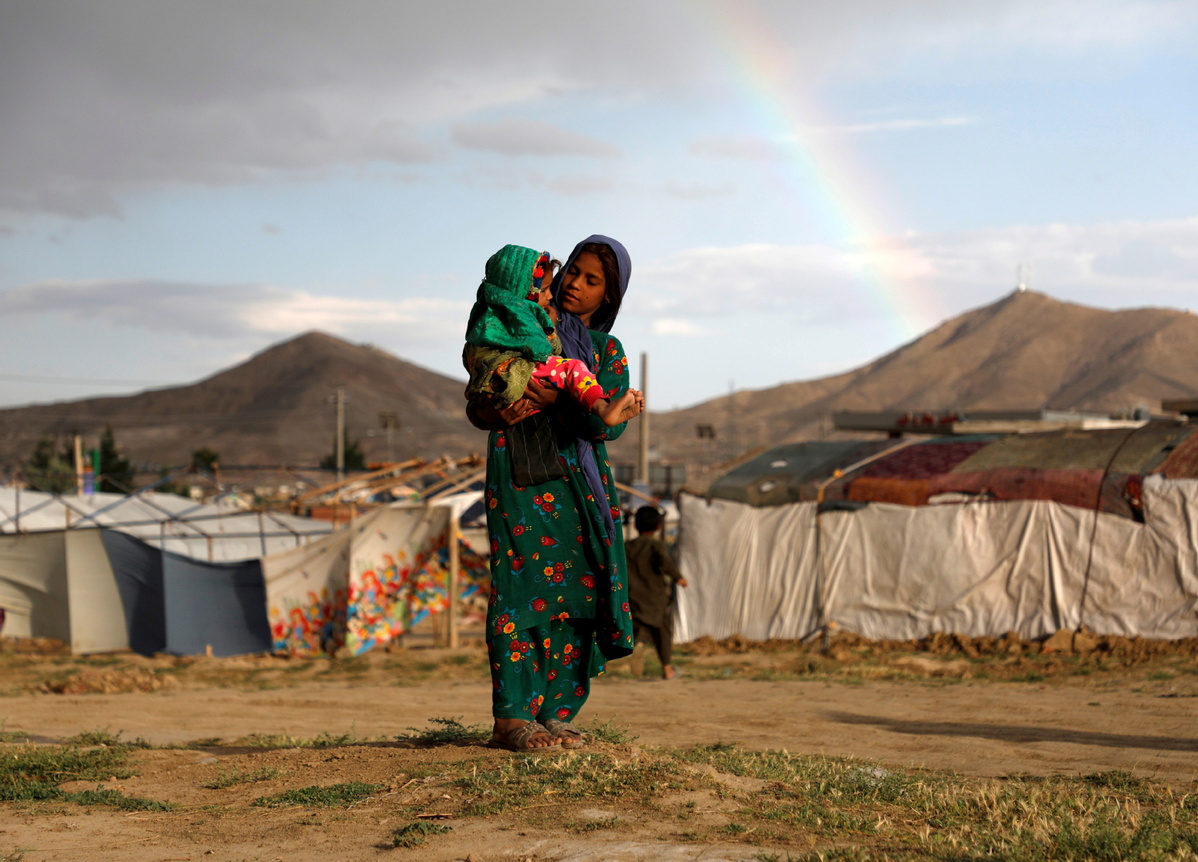
European Union foreign ministers were due to hold a crisis meeting on Tuesday to discuss a plan for assisting refugees fleeing from Afghanistan following the swift collapse of the country's Western-backed government.
The EU's economy commissioner Paolo Gentiloni said in an interview with an Italian newspaper on Tuesday that Europe must make efforts to ensure the flow of immigrants is managed safely.
"I think that Europe will inevitably have to equip itself for humanitarian corridors and organized reception, also to avoid uncontrolled flows of illegal immigrants. Or, at least, the countries that are willing to do so, should," Gentiloni told il Messaggero.
The EU's foreign policy chief, Josep Borrell, said in a social media post on Monday announcing the planned meeting of ministers that "Afghanistan stands at a crossroad".
"Security and wellbeing of its citizens, as well as international security, are at play," he said.
Following the withdrawal of United States and other international forces in June, the Taliban movement, which already controlled some parts of the nation, gained confidence and swept across the country in just 10 days, arriving in the capital Kabul on Sunday.
This prompted chaos at Kabul airport, which is still controlled by a small US force, as thousands of citizens rushed there in a desperate attempt to flee. News agencies reported that up to seven people died in the mayhem at the airport on Monday.
Foreign ministry spokesperson Hua Chunying said on Monday that China will "continue developing good-neighborly, friendly and cooperative relations with Afghanistan".Russia and Iran have also made diplomatic overtures, reported Al Jazeera. China has repeatedly criticized what it sees as the US' hasty withdrawal from Afghanistan as a failure of leadership, reported the Agence France-Presse news service.
In the United Kingdom, Prime Minister Boris Johnson is coming under pressure from activists and members of Parliament to urgently create a resettlement initiative for Afghan refugees. A government spokesperson said details were being finalized on a program that will "focus on helping the most vulnerable and women and girls in particular", Sky News reported.
Downing Street said a virtual meeting of G7 leaders would be held in the "coming days" to coordinate international efforts on ensuring "Afghanistan doesn't again become a base for terrorism, to coordinate humanitarian efforts, and to discuss expectations of what government might emerge in Afghanistan".
The UK foreign secretary, Dominic Raab, said in interviews on Tuesday that the British government was doing "everything we can "to remove both UK nationals and Afghans eligible under the Afghan Relocations and Assistance Policy, which provides relocation for locals who worked for UK forces.
Speaking on the BBC's Today radio program, Raab said he was "doing everything physically possible to get British nationals out, to get as many of those who have loyally served us out, and also to think about how we then move forward with an international strategy which can stabilize the situation for the people of Afghanistan".
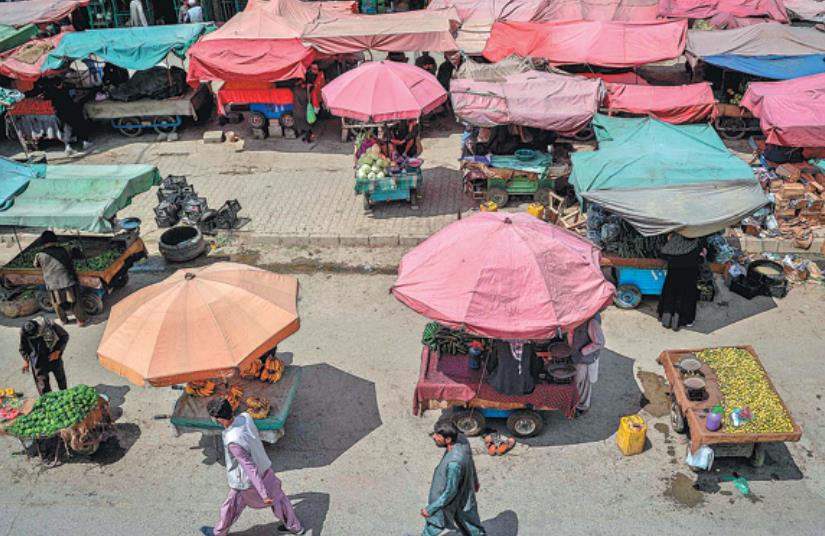
Military intervention and power politics doomed to fail, FM says
Beijing had discussions with Washington and Moscow over Afghanistan on Monday and urged the building of an "open and inclusive" political architecture in the war-torn nation, facilitation of reconstruction and preventing the growth of terrorism.
In separate phone calls with United States Secretary of State Antony Blinken and Russian Foreign Minister Sergey Lavrov, State Councilor and Foreign Minister Wang Yi said the Afghanistan situation shows that military intervention and power politics are doomed to fail.
Drastic changes have taken place in the Central Asian nation in recent days as the Taliban took control of the country after seizing Kabul, the capital, on Sunday.
Officials and experts said the developments in Afghanistan are the fallout from Washington's Afghan policy failure and its hasty military withdrawal, which show that double standards over counterterrorism stoke chaos and dampen hopes of eradicating terror.
"Lessons should be learned," said Wang, noting that a regime will not last long without the support of its people. He added that power politics and military operations trigger problems rather than resolving them.
Su Xiaohui, deputy director of the Department of American Studies at the China Institute of International Studies, said, "Behind the developments in Afghanistan is the US' deep-seated security and foreign policy mistake, which is its longstanding preference to impose its will and intervene in other nations."
In an interview with China Central Television on Monday, China's Ambassador to Afghanistan, Wang Yu, urged Chinese nationals remaining in Afghanistan to beef up security precautions and leave the country when conditions permit.
As an advocate of political settlement in the country, China has consistently respected the will of and kept contact with all parties in Afghanistan, including the Taliban, Foreign Ministry spokeswoman Hua Chunying said on Tuesday.
Yue Xiaoyong, the Chinese government's special envoy on Afghanistan, is playing a mediating role, visiting a number of countries including Qatar, Russia, Turkey and Iran to discuss the situation, Hua said.
Over the past 40 years, Afghanistan has suffered great damage, including from the armed intervention by the US, and "its future government is faced with the arduous task of reconstruction of the war-torn land", said Xu Yicong, a researcher at the China Foundation for International Studies and a former ambassador to Cuba.
China has honored its nonintervention principle and never meddled in its neighbor's internal conflicts, which has won it respect from various parties, Xu said.
In his talk with Lavrov, Wang Yi said the Taliban is being encouraged to follow a mild religious policy and work with all parties in the country to build a political architecture of "openness and inclusiveness".
The new regime in Afghanistan should "draw a line from various international terrorist groups" and restrain and crack down on terrorist forces, including the East Turkestan Islamic Movement, he said.
Wang said China and Russia should brief each other on developments in Afghanistan and ensure the safety of their citizens and agencies. Lavrov said Russia is ready to compare notes with China over the evolving situation and make a joint response.
"This shows the shared priority placed by China and Russia over the security black hole left by the US' hasty withdrawal, as well as their high-level strategic coordination in regional, global issues," said Su, the CIIS scholar.
Wang told Blinken that Beijing is willing to communicate with Washington to push for a "soft landing" of the Afghanistan issue. He also criticized the previous US administration for removing the ETIM from a list of terror organizations last year.
This was "a dangerous and erroneous move", Wang Yi said as he urged Washington to remove obstacles for China-US collaboration on Afghanistan and fighting international terrorism.
Blinken reiterated the US' opposition to any form of terrorism and added the US does not want turbulent situations in the western border areas of China.
The developments in Afghanistan again showed the importance of constructive and pragmatic collaboration between the US and China on regional security issues, he said.
Wang told Blinken the US "should not rely on China for support and coordination when it is sparing no effort in containing and repressing China" as this approach doesn't work for interaction between any countries.
The US should show respect and explore a path for peaceful coexistence between the two countries, Wang said.
He urged the US to follow a reasonable, pragmatic policy, respect China's core interests and major concerns, step up dialogue and manage and control divergence in order to get ties back on track.
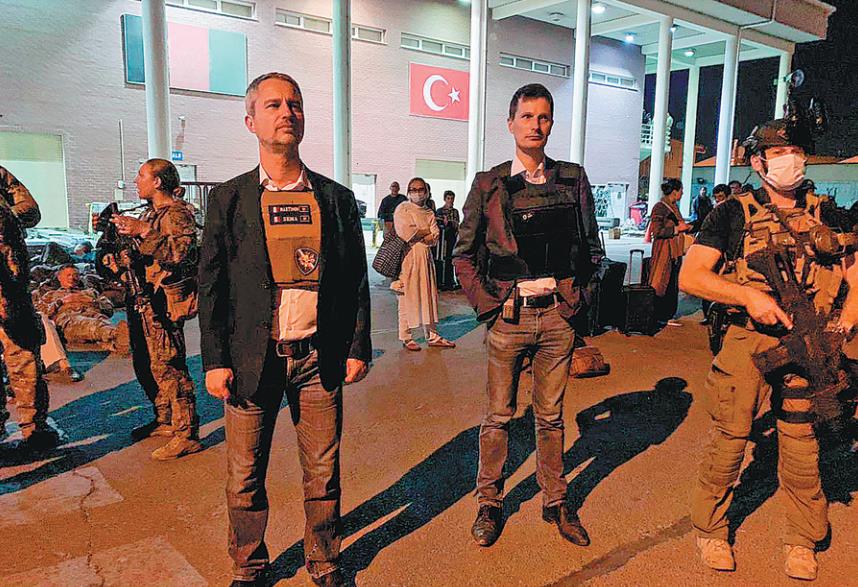
The Taliban moved on Tuesday to quickly restart the Afghan capital following their stunning takeover of Kabul and told government staff to return to work.
"Those working in any part or department of the government should resume their duties with full satisfaction and continue their duties without any fear," a Taliban statement said.
They declared an amnesty across the country and urged women to join their government, trying to calm nerves across the tense city that only the day before saw chaos at its airport as people tried to flee.
There were no major reports of abuses or fighting in Kabul and many residents chose to stay at home. Some shops also reopened as traffic police were back on the streets.
The comments by Enamullah Samangani, a member of the Taliban's cultural commission, represent the first comments on governance from a federal level across the country after their blitz.
"The Islamic Emirate doesn't want women to be victims," Samangani said, using the Taliban's term for Afghanistan. "They should be in government structure according to Shariah law."
He added: "The structure of government is not fully clear, but based on experience, there should be a fully Islamic leadership and all sides should join.
"Our people are Muslims and we are not here to force them to Islam," he said.
Senior Taliban leader Amir Khan Muttaqi has already held several rounds of talks with Kabul's political leadership, including Abdullah Abdullah, who once headed the country's negotiating council, and former president Hamid Karzai, The Associated Press reported. At least one round of the talks went through the night.
Moderate policy
China encourages the Afghan Taliban to pursue a moderate religious policy and hopes that the new Afghan government can make a clean break with all kinds of international terrorist forces, Foreign Ministry spokeswomen Hua Chunying said on Tuesday.
China hopes the Taliban can work with all parties in setting up an open and inclusive political framework, and pursue a peaceful and friendly foreign policy, particularly developing friendly relations with neighboring countries, to achieve reconstruction and development in Afghanistan, she told a daily news conference in Beijing.
She urged relevant parties in Afghanistan to take effective measures to ensure security and stability in the country, maintain public order and safeguard the safety and legitimate rights of the Afghan people and foreigners.
Meanwhile on Tuesday, military flights evacuating diplomats and civilians from Afghanistan resumed after the runway at Kabul airport was cleared of thousands of people eager to flee.
The number of civilians had thinned out, a Western security official at the airport told Reuters, a day after chaotic scenes in which US troops fired on crowds and people clung to a US military transport plane as it taxied for takeoff.
"Runway in Kabul international airport is open. I see airplanes landing and taking off," Stefano Pontecorvo, NATO's civilian representative, said on Twitter.
By afternoon, at least 12 military flights had taken off, a diplomat at the airport said. Planes were due to arrive from countries including Australia and Poland to pick up their nationals and Afghan colleagues.
A special military flight with nearly 120 Indian officials separately landed in the western state of Gujarat after taking off from Kabul's main airport on Tuesday, the Press Trust of India and state TV reported. Another flight made it off the ground on Monday as well.
Sweden's Foreign Minister Ann Linde said on Twitter on Tuesday that the staff from the Swedish embassy had returned to Sweden.
A French Defense Ministry official said on Tuesday that the first planeload of French nationals evacuated from the Afghan capital was scheduled to arrive in France on Tuesday afternoon.
Agencies and Xinhua contributed to this story.
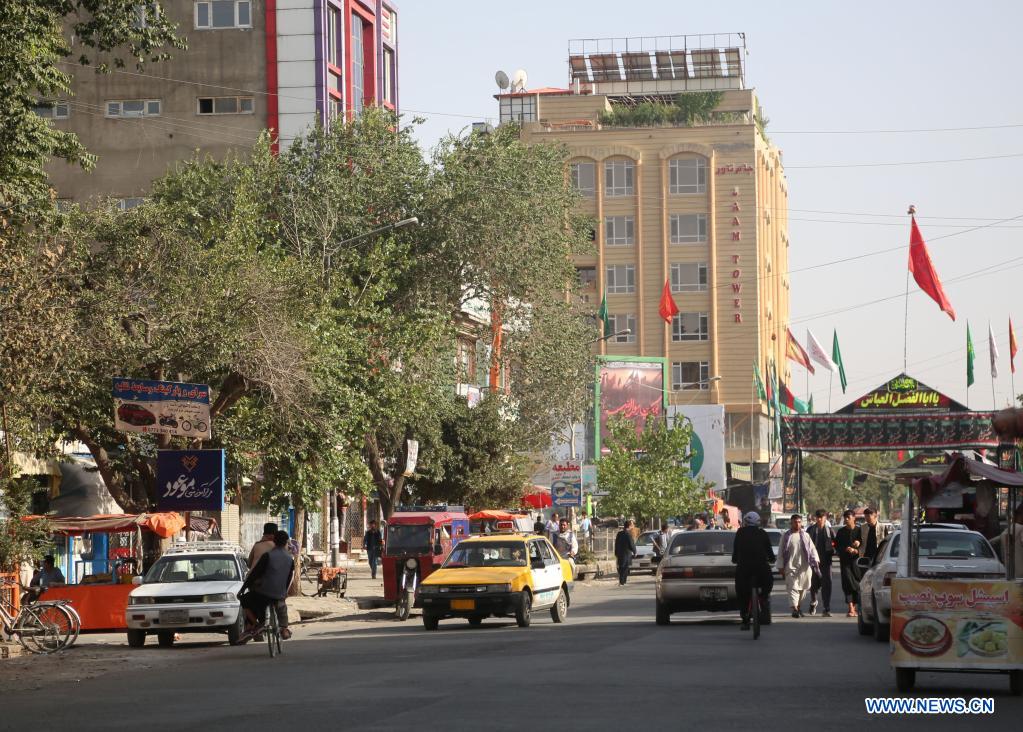
KABUL - Normality has returned to Kabul, capital of Afghanistan as the Taliban on Tuesday urged the government employees to return to work, two days after the group took control of the capital.
Declaring a general amnesty, the Taliban urged all to start routine life with confidence.
It also urged women to join its government.
Taliban spokesman Zabihullah Mujahid tweeted that the situation in Kabul was completely under control and law and order returned to the city.
Mujahid reiterated that life and properties of people were safe as there are reports that the Taliban has arrested about 200 people involved in looting of government properties and vehicles.
The Taliban leadership has ordered its members and "once again instructs them that no one is allowed to enter anyone's house without permission. Life, property and honor of none shall be harmed but must be protected", Mujahid said.
Late on Monday, flight of military transport planes was resumed and dozens of flights were conducted all the night, according to residents living around the airport. The planes were evacuating foreigners and some of their Afghan workers. The flight suspended on Monday morning after a big rush of people at the airport.
Taliban members on Monday took control of the outside of Kabul airport while thousands of US forces were inside the airport helping evacuating the crowds. At least 10 Afghans were reportedly killed in the stampede and a shooting inside the airport within the past two days.
Also On Monday, the offices of the Afghan Public Health Ministry and the Kabul municipality were reopened. Wahid Majrooh, acting minister of public health, appeared together with Taliban public health representatives in a televised footage, urging medical workers to return to their jobs, including female medical employees.
Small shops were also reopened around the city while banks and business centers mostly remained closed as of Tuesday morning.

NEW YORK - The hasty withdrawal of US troops and the rapid unravelling of Afghanistan have made America's allies and others further doubt its credibility, according to a Friday report in The New York Times.
The retreat of US troops from Afghanistan has heightened the sense that "America's backing for its allies is not unlimited," said the report.
It is "bound to sow doubts" as some of America's allies in Europe and Asia wished that the current US administration "would reestablish America's firm presence in international affairs," it said.
The issue for America's allies and others, though, is less "credibility," a much misused term, than ability to see commitments through to the end, the report quoted former French diplomat Jean-Marie Guehenno as saying.
"The military debacle of Afghanistan, coming after the diplomatic debacle of Syria, will make Western nations more inward-looking, cynical and nationalist, as they feel surrounded by a world that they don't control, but keeps intruding," he said.

BEIJING - Days before Taliban forces entered the Afghan capital of Kabul, US President Joe Biden said at a news conference that he did not regret his move to withdraw troops from Afghanistan.
However, with the news of Afghan President Ashraf Ghani leaving the country and the images of the United States scrambling to evacuate staff and top officials from its embassy in Kabul broadcasted worldwide, US experts said Washington should regret its premature and irresponsible troop withdrawal.
"Today is the culmination of President Biden's strategic error in directing the rapid and complete withdrawal of US -- and thus all international -- forces and the failure to have done the planning necessary to prevent the resulting catastrophic collapse of the Afghan government," James B. Cunningham, nonresident senior fellow in the South Asia Center and former US ambassador to Afghanistan, said in a statement.
According to Cunningham, Biden made the wrong choice on troop withdrawal. "Biden could have declared that US withdrawal was conditioned on a genuine peace agreement and ceasefire, and focused on that objective with an extensive diplomatic effort."
In a speech in April announcing the withdrawal of US troops, Biden claimed the United States had achieved its counterterrorism objectives.
"We cannot continue the cycle of extending or expanding our military presence in Afghanistan, hoping to create the ideal conditions for our withdrawal, expecting a different result," Biden said then.
For Daniel Fried, former US National Security Council senior director, ambassador to Poland and assistant Secretary of State for Europe, even if one accepts the US administration's reasoning behind the withdrawal, "the hasty execution made disaster more likely."
"The White House looks feckless and ignorant about the situation on the ground and appears to have made its key decision based on bad assessments -- or no assessments at all," said Fried in a statement.
"I would bet a large amount that there are many at senior levels in the Biden administration who wish they could roll back the clock a few months," said Fried.
Meanwhile, online videos showed Afghans flocking to departing planes at Kabul's Hamid Karzai International Airport after the Taliban retook the capital.
On Saturday, Biden said he had authorized the deployment of roughly 5,000 troops to Afghanistan to support a personnel drawdown. However, according to Richard Engel, chief foreign correspondent for NBC News, the new deployment did little to allay chaos on the civilian side of the airport.
"And the US has brought in thousands of troops to secure the airport. But US only focused on securing evacuation, taking place on military side of Kabul airport. Another sign of disregard for Afghans and total lack of planning," Engel tweeted.
For Irfan Nooruddin, director of the Atlantic Council's South Asia Center and professor in the School of Foreign Service at Georgetown University, the Biden administration's April announcement "might be the straw that broke the camel's back, but every US administration since 2001 is culpable and must be held accountable."
"The hollowness of American statements about democracy and human rights has long been understood by those outside the Washington bubble -- but the long-term damage to the credibility of American rhetoric from the disaster will be felt for years to come," said Nooruddin in a statement.
According to Adam Weinstein, research fellow at the Quincy Institute for Responsible Statecraft and an Afghanistan combat veteran, the real failure lies with the mistaken belief that "the United States could shape conditions and foster effective governance through the force of arms."
"The chaos that follows intervention and the chaos that follows withdrawal are rooted in the same fundamental mistake -- that the US thinks it can use its military to affect permanent social and political change in countries that it occupies," Weinstein said in a statement.
US President Joe Biden made a forceful defense Monday of the troop withdrawal from Afghanistan, saying that Americans should not be fighting in a war in which Afghans themselves won't engage wholeheartedly, while observers weighed in with mixed views on an ignominious end to the 20-year engagement.
Meanwhile, scenes of chaos at the Kabul airport continued, with people desperately looking to leave by trying to latch onto American military planes as the Taliban took control of the country. Several civilians fell to their death.
"The truth is, this did unfold more quickly than we had anticipated," the president said. "Afghanistan political leaders gave up and fled the country. The Afghan military collapsed, sometimes without trying to fight. If anything, the developments of the past week reinforced that ending US military involvement in Afghanistan now was the right decision."
Biden said the US' original mission of counterterrorism had morphed into nation-building and counterinsurgency.
"Our mission in Afghanistan was never supposed to have been nation-building. It was never supposed to be creating a unified, centralized democracy. Our only vital national interest in Afghanistan remains today what it has always been: preventing a terrorist attack on (the) American homeland," the president said during an 18-minute address at the White House.
Biden said that when he took office in January, he inherited a deal that former president Donald Trump negotiated with the Taliban, an agreement that American forces would be out of Afghanistan by May 1, 2021.
Trump, who exchanged criticism about Afghanistan with Biden on Saturday, said Monday: "It's not that we left Afghanistan. It's the grossly incompetent way we left!"
Senate Minority Leader Mitch McConnell of Kentucky called the scenes of withdrawal "the embarrassment of a superpower laid low".
But Biden said US forces had already drawn down during the Trump administration from roughly 15,500 to 2,500. "And the Taliban was at its strongest militarily since 2001," he said.
"We spent over a trillion dollars. We trained and equipped an Afghan military force of some 300,000 strong. … We gave them every chance to determine their own future. What we could not provide them was the will to fight for that future."
Longtime New York Times columnist Thomas Friedman wrote that "it was never about the way our Afghan allies fought. It was always about their will to fight for the corrupt pro-American, pro-Western governments we helped stand up in Kabul."
He said that "the smaller Taliban forces — which no superpower was training — had the stronger will, as well as the advantage of being seen as fighting for the tenets of Afghan nationalism: independence from the foreigner and the preservation of fundamentalist Islam as the basis of religion, culture, law and politics".
On Capitol Hill, the reaction was mixed.
"We didn't need to be in this position; we didn't need to be seeing these scenes at Kabul airport with our Afghan friends climbing a C-17," said Representative Jason Crow, a Colorado Democrat and a former Army Ranger who served in Afghanistan, to The New York Times.
"Thank you President Biden for learning from past mistakes and for clearly articulating the costs of endless war," Representative Ilhan Omar, Democrat of Minnesota, said on Twitter.
Other experts also had divergent views on the fallout of the US withdrawal.
Richard N. Haass, president of the Council on Foreign Relations (CFR) wrote that the "hasty and poorly planned" withdrawal may not provide sufficient time to evacuate Afghans who worked with the US and Afghan governments.
"Beyond the local consequences, the grim aftermath of America's strategic and moral failure will reinforce questions about US reliability among friends and foes far and wide," he wrote on the CFR website.
Anthony Cordesman, strategy chair at the Center for Strategic and International Studies, said that Biden "made a strong case — that no matter how long we stayed, we couldn't achieve the objective of somehow creating an effective government and democracy".
Ted Galen Carpenter, a senior fellow for defense and foreign policy studies at the Cato Institute, noted that being an advocate of US military interventions "apparently means never having to say you're sorry, no matter how obvious and severe the blunders".
"But continuing to risk the lives of US troops and pour billions of taxpayer dollars down the drain for decades to come in the forlorn hope that we can transform Afghanistan into a viable Western‐style democracy is neither a realistic nor a moral option," Carpenter wrote in an article titled "Why Afghanistan Abruptly Collapsed".
"Vietnam and Afghanistan (along with Iraq, Libya, Syria, and several other countries) are places in which US meddling has made matters worse rather than better," he added.
Justin Logan, also a senior fellow at the Cato Institute, noted that US policy in Afghanistan and the government's message to the American people about it have been built on "lies" and delusions. "The American people, having happily swallowed those lies, are now aghast," he wrote Monday.
"President Biden is not alone in bearing blame for the events unfolding in Afghanistan. The senior military and intelligence officials, who for years gave an inaccurate picture of the realities on the ground to Congress, must also be held responsible," said Adam Brandon, president of FreedomWorks.
But Aaron David Miller, Carnegie Endowment for International Peace senior fellow, said that "the only thing he (Biden) seemed to concede in terms of his responsibility was the fact that they had underestimated the speed at which the Taliban took territory and ultimately took Kabul".
In a webinar hosted by Code Pink on Monday, Zaher Wahab, an Afghan American scholar, said: "We have to ask the question: Why did the Afghan military fail, given all the training, the technology, the expenses? ... It shows the failure of the American intelligence, the American military, the American policy, and the American diplomacy. ... First, it (the US) should never have attacked Afghanistan. It was illegitimate, illegal, immoral, inhuman. When it did, it should have left as soon as the Taliban had been dislodged. … Why it stayed, we know, because it's called imperialism by a different name."
The withdrawal also has raised concerns about civilians in Afghanistan.
Senator Jeanne Shaheen, a New Hampshire Democrat and a member of the Senate Armed Services and Foreign Relations committees, said in a statement Monday that the images of Afghan civilians at the airport pleading to be evacuated are "seared into our minds".
She called for an immediate expansion of the refugee program for Afghan women seeking asylum. "A failure to act now will seal their fate, and the generation of girls who grew up with freedoms, education and dreams of building their country's future will die with them," Shaheen stated.
Phyllis Bennis, a fellow of the Institute for Policy Studies, said at the Code Pink webinar: "We need to focus on our obligations to the people of Afghanistan. … It means we need to fight for a vast expansion of the numbers of refugees and asylum seekers that are welcome in this country.
"We need to fight for a permanent end to the bombing raids and the CIA death squads that have been circulating through Afghanistan," she said. "In these last weeks, we think that maybe the bombing raids have ended, but that's not even clear, and we know that that's not a permanent commitment."
Lia Zhu in San Francisco contributed to this story.
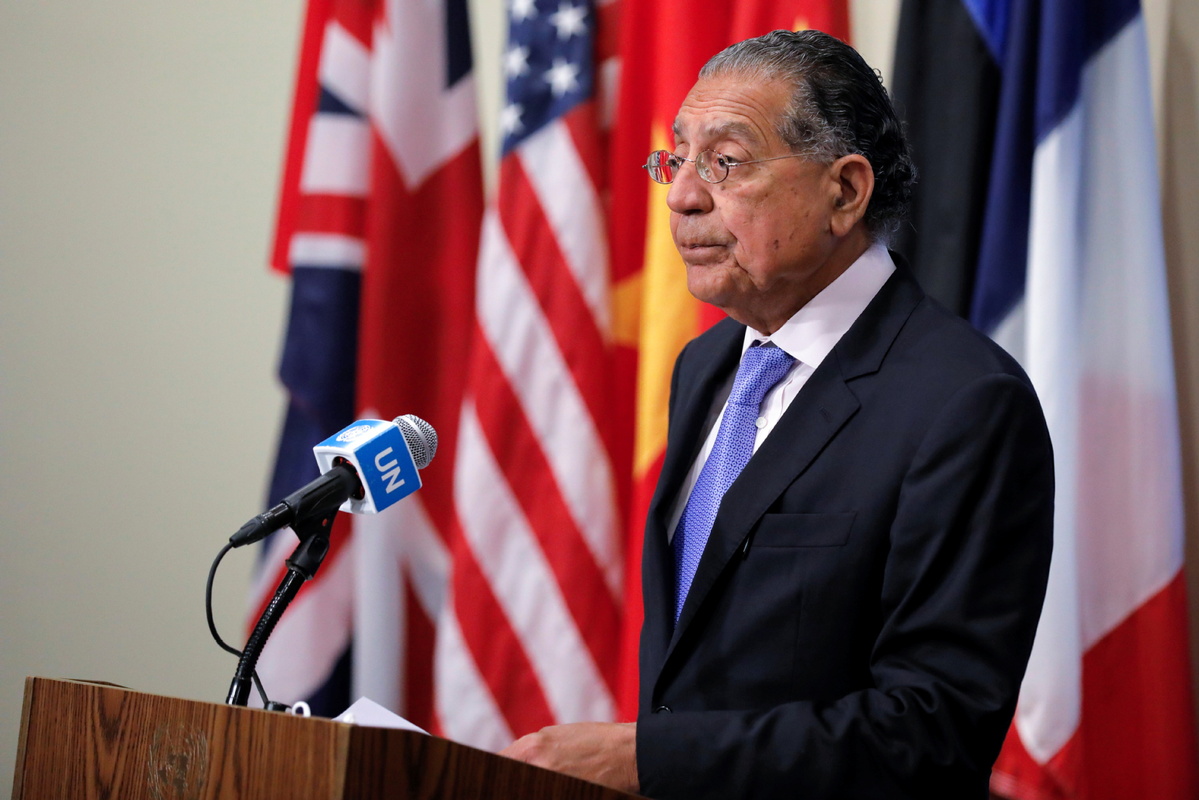
UNITED NATIONS - Pakistan is actively promoting an inclusive political settlement in Afghanistan and helping evacuate diplomats, representatives of international organizations, and others from Kabul, said Pakistan's UN ambassador Munir Akram on Monday.
Leaders of a number of political parties and groups in Afghanistan, representing all the multi-ethnic groups, apart from the Pashtuns, were present in Islamabad and met with the Pakistani leadership on Monday, he told reporters.
"They have promised to engage continuously with the Taliban and to try to evolve an inclusive Afghan government. Pakistan will work with them and with the Taliban representatives to advance this objective -- the objective of an inclusive political government, which is important for durable peace and stability in Afghanistan," he said.
Pakistan is also making efforts to facilitate the safe evacuation of diplomats, representatives of international organizations, and others from Afghanistan, said Akram.
"We are evacuating all diplomatic personnel who wish to evacuate and wish to come through Pakistan, all representatives of international agencies who have requested our help in being evacuated, and all other personnel who feel that they are in danger. We would be willing to look at the possibility of taking them out."
Whenever needed, arrangements will be made for issuing visas to such people on arrival in Pakistan, he said.
A facilitation center has been set up by the Pakistani Interior Ministry to ensure the expeditious processing of visas and other requirements to enable the smooth and timely evacuation from Kabul, said Akram. "We will try to mount a series of flights to Kabul Airport as soon as conditions allow in order to continue the evacuation, which we have already started."
On Monday, Pakistan evacuated 421 Afghan employees of the Danish Embassy in Kabul, he noted.
He said Pakistan has called on all Afghan parties, including the Taliban, to ensure the preservation of law and order in Kabul and elsewhere. The immediate priority should be at the maintenance of law and order and the safety and security of all Afghan civilians, especially women and children. Fundamental human rights must be upheld. All civilian property and infrastructure must be protected. There must be complete respect for human rights and international humanitarian law, said Akram.
The safety and security of the diplomatic community and premises, as well as UN personnel, humanitarian workers and other international staff is paramount. There is a need to urgently address the humanitarian situation in Afghanistan, he said.
Apart from these immediate actions, the international community should look ahead to other steps designed to promote durable peace and stability in Afghanistan, he said.
The infrastructure destroyed in this long conflict needs to be reconstructed, including the transport infrastructure which can enable Afghanistan to serve as a hub for regional trade and commerce.
The international community also needs to engage with the new authorities in Afghanistan to eliminate the threat posed by terrorist organizations in Afghanistan, he said.
The Pakistani ambassador regretted the fact that his country's request to participate in Monday's Security Council emergency meeting on Afghanistan was turned down by India, which holds the Security Council presidency for the month of August.
"This is most regrettable because we believe that Pakistan has an important contribution to make at this important and vital juncture in the destiny of Afghanistan, and the stability and peace in our region," said Akram.
